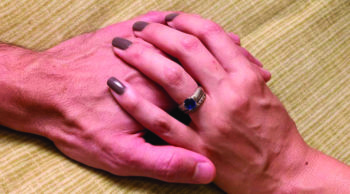When a Friend Grieves

By Victor M Parachin
Seven Ways to Help
I was heartbroken. I was beyond devastation.
I wanted to die, pack it in, call it a day, call it quits, stop in my tracks.
My son, Clark, was the light of my life, the bright, beautiful,
creative boy who had survived so much, and been such a solace and beauty.
Now he was gone. I could not see a way to live beyond that terrible day.
 Those words, written by singer Judy Collins, reveal the powerful pain which the death of a loved one delivers. Sooner or later, you will know someone whose life has been touched by a death. It could be a relative, a neighbour, a colleague, a co-worker, a friend, an acquaintance. The death may be by suicide, by illness, by accident, by homicide or it may be sudden and unexpected. No matter what the cause or how death arrives, the loss results in deep distress. In order to adjust, adapt and advance, grievers need the support of their friends. “When spider webs unite, they can tie up a lion”, is the wisdom of an Ethiopian proverb.Here are seven ways to help when someone you know is grieving.
Those words, written by singer Judy Collins, reveal the powerful pain which the death of a loved one delivers. Sooner or later, you will know someone whose life has been touched by a death. It could be a relative, a neighbour, a colleague, a co-worker, a friend, an acquaintance. The death may be by suicide, by illness, by accident, by homicide or it may be sudden and unexpected. No matter what the cause or how death arrives, the loss results in deep distress. In order to adjust, adapt and advance, grievers need the support of their friends. “When spider webs unite, they can tie up a lion”, is the wisdom of an Ethiopian proverb.Here are seven ways to help when someone you know is grieving.
1. Be there with compassion
“Mourn with those who mourn,” is teaching of St Paul (Romans 12:15, NIV). That means a compassionate presence so that your friend can express his or her feelings knowing they will not be judged nor criticised by you. Let the griever do most of the talking. Your task is simply to listen, listen, listen. Try to see your role as a friend who walks with, not behind nor in front of your bereaved companion. As you offer your presence and friendship, you will become the surprise gift which emerges from an agonising loss. Lynne B. Hughes was 9 when her mother died and 12 when her father died. Growing up without her parents was harrowing. Yet the few bright spots revolved around people who knew how to practice compassion.
In her book, You Are Not Alone: Teens Talk About Life After the Loss of a Parent, she recalls: “A few things helped me ‘manage’ or cope with the loss of my parents. I had a best friend who I told everything to. She was the one person who listened and knew everything I was dealing with. She was my rock. Taking the risk of reaching out to people who somehow seemed like they ‘got it’ also helped. There were a few guidance counsellors, teachers and coaches who went out of their way to take an interest in me or ‘check on’ me. Did they fill the huge hole inside of me? No, not completely, but for a short time, they filled in a piece of the hole, which helped me get a little stronger”. Hughes also notes that when it comes to grieving, there are two types of people: “those who ‘Get It’ and those ‘Who Don’t’. . . . when you find the people who get it, exhale, relax . . . and be yourself. They will understand when you want to be quiet, when you want to cry, and when you just want a hug. They will be true gifts to you”.
2. Be skilful with your help
Generally, there are two types of people experienced by grievers. There are those who are skillful and those who are unskilled in responding to the pain of loss. Sadly, in the biblical story of Job and his many losses, he lamented about his unskillful friends saying, “. . .miserable comforters are you all” (Job 16:2). Those who respond in unskillful ways to grievers often use statements like these:
- I know just how you feel.
- Get a grip on yourself.
- This isn’t the time to fall apart.
- It’s a blessing in disguise.
- This was the will of God.
- You’re young. You can marry again.
- You’re young. You can have other children.
- Calm down, now. No tears.
- It’s better now that it’s over.
Such statements should be avoided completely. Those who respond with skill employ these types of sentences:
- I am so sorry about your loss.
- Do you feel like talking?
- This must be very difficult.
- How are you and your family doing?
- I don’t know what to say but want you to know I care.
- How can I help?
- What do you need me to do?
 3. Pray for your grieving friend
3. Pray for your grieving friend
The journey through grief is lonely and, at times, frightening. It is not an easy journey and it is filled with pitfalls. Make it your mission to pray regularly for your friend’s ongoing health and recovery. As you pray, do so with confidence, recalling these words from the Psalm writer, “The Lord is near to the brokenhearted and saves the crushed in spirit” (Psalm 34:18). “God heals the brokenhearted and binds up their wounds” (Psalm 147:3). Your prayer - daily if possible - can be succinct and to the point.
Here’s an example:
Loving God, be with James. Give him confidence that he can meet and greet each new day with confidence and wisdom. Strengthen his patience and faith. Day by day, gently direct him toward healing and wholeness.
4. Help cultivate hope
Among grievers there is a natural tendency to idealise the past and demonise the future - I’ve lost everything; there’s nothing to look forward to - is a common refrain from the bereaved. When your friend starts feeling and believing that all she can expect is darkness, remind her of the light behind the shadow. When your friend starts feeling and believing that the relentless pain will always be present, offer him gentle reminders that hurting can give way to healing. Help your friend cultivate hope and envision a future life beyond the grip of grief. Speak and respond in ways which help a griever believe in herself or himself and have faith in their ability to manage bereavement.

5. Encourage activity
When there is loss, the natural tendency is to retreat and withdraw. While some solitude can facilitate healing, complete seclusion increases the sense of isolation, despair and hopelessness. Encourage your bereaved friend to stay active. After her son died, Judy Collins said “I had to find the hoops that would bind me to life again. I needed to reach out my arms and my mind and my soul …” So, she became engaged with life saying, “I started writing, getting the journals out and doing the work day by day, telling the tale, talking about my rage, my sorrow … I went to museums … I went back to work, not cancelling all my concerts, all my plans, as I had thought I would. I went back to talk to a therapist…”
6. Appreciate the uniqueness of grief
There are no logical ‘steps’ or ‘stages’ of grieving. It’s more an ebb and flow of feelings and thoughts, responses and reactions. Grief is unique to each individual experience. In his book, Living With Loss, Healing With Hope, Rabbi Earl A. Grollman writes, “Don’t compare your loss with the loss of others. Each death is different. Each bereavement is unique. When it is the death of a child, it is the death of your future. When it is the death of a parent, it is the death of your past. When it is the death of a spouse, it is the death of the present”. As you help your friend manage bereavement, factor into your own thoughts the reality that your friend’s grief is unique. Free yourself of any preconceived grief expectations and allow your friend the freedom to explore and heal in ways which work with his or her personality. Avoid comparing and judging your friend’s process with that of others. This is unproductive.
 7. Be especially attentive if your grieving friend is a man
7. Be especially attentive if your grieving friend is a man
Women generally receive an enormous outpouring of support. Much of the literature about grief issues is directed primarily to women. Men, however, are often sidelined. Mitchell D. Carmody of Hastings, MN, experienced the death of his father when he was 14 and later the death of his daughter. As a man acquainted with grief, he writes, “In our ‘modern day’ society, it is especially difficult for fathers to grieve openly, caught in a catch 22 of how to express the deep pain we are experiencing.
“Men don’t cry, men do not emote, men do not hug (except maybe at the funeral), men don’t go to support groups, men don’t call in sick because they are screaming inside, because we are the men of the family.
“Fathers are the fix-it guys, the protectors, the strength and the rock the family needs for support. More times than not, people will ask the father, ‘How is your wife doing? This must be extremely hard for her’.”
The lesson from his experience (and that of many male grievers) is this: men need emotional support just as much as do women. The impact of grief is gender neutral.
 Entries(RSS)
Entries(RSS)